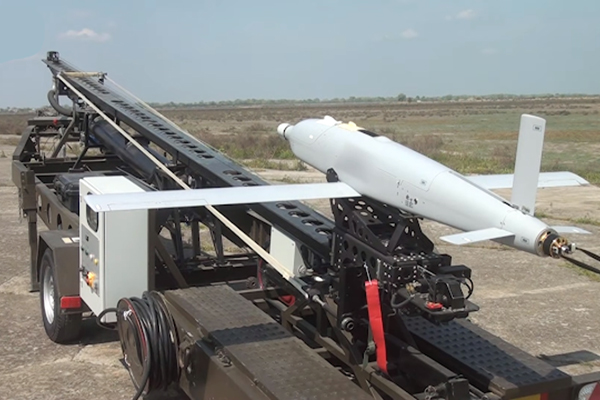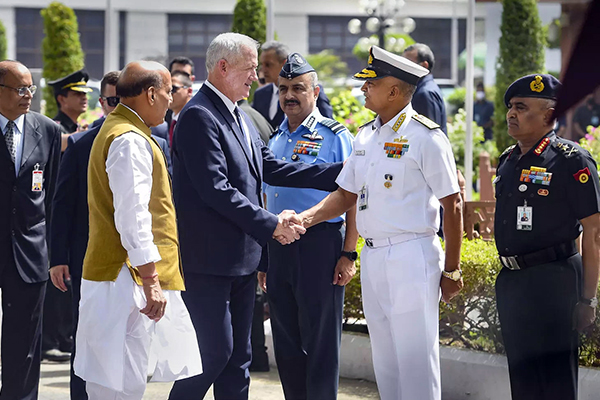Israeli defence minister’s visit to India
India and Israel, on 2 June, signed a ‘vision Statement’ to further deepen the long-standing defence cooperation. This was adopted at a meeting between Defence Minister Rajnath Singh and his visiting Israeli counterpart Benny Gantz.
India is an industrial superpower and Israel is a technological superpower – cooperation between our countries will expand the capabilities of both countries to contend with developing challenges, Gantz said.
“The two Ministers presented a joint declaration marking 30 years of Israel-India relations and reiterated their commitment to deepening defence ties,” a statement from Gantz’s office said. “India and Israel share similar and common challenges, including border security and fighting terrorism. By working together, we may increase our capabilities and ensure the security and economic interests of both countries,” Gantz said.
A Letter of Intent on enhancing cooperation in the field of futuristic defence technologies was also exchanged between the two Ministers, a Defence Ministry statement said.
The discussion covered topics including strategic global challenges, military cooperation, defence industrial cooperation and joint Research and Development (R&D). They also discussed a cooperation agreement signed between the Indian Defence Research and Development Organisation (DRDO) and Israel’s Directorate for Defence R&D, which will enable the expansion of technological collaboration and development between the countries.
The Ministers declared their intention to further develop defence cooperation in a manner that harnesses Israel’s “technological advance and operational experience”, together with India’s “extraordinary development and production capabilities”, the statement said.
In addition, the Ministers discussed partnerships within the government-to-government framework, military training, and technological cooperation with a focus on Unmanned Aerial Vehicles (UAV) and defensive capabilities, the statement added.
10-year Roadmap
In October 2021, India and Israel had agreed to form a task force to formulate a comprehensive 10-year roadmap to identify new areas of cooperation as part of efforts to further advance the bilateral defence cooperation. This was agreed at the 15th India-Israel Joint Working Group (JWG) meeting on bilateral defence cooperation held on October 27, 2021 in Tel Aviv, Israel, the Defence Ministry had stated. The JWG is the apex body between the Defence Ministries of the two countries to comprehensively review and guide all aspects of bilateral defence cooperation.
At the same meeting, it was also decided to form a Sub Working Groups (SWG) on defence industry cooperation and in this regard, a Terms of Reference was signed between the two sides. The SWG would enable efficient utilisation of bilateral resources, effective flow of technologies and sharing industrial capabilities, the Ministry had stated.
Overview of Defence Cooperation and Trade
India, since 2017, has also become a strategic partner and a co-producer of Israeli weapons. Over the past five years, both countries have conducted joint military drills and hosted police and army training and exchange visits.
The India-Israel relationship has grown significantly over the last 30 years especially in the field of missiles, radars, electronic warfare systems and other weapons and equipment.
But it hasn’t always been this way. Until 1992, India did not have diplomatic relations with Israel. Now, India and Israel have inked separate deals worth around $3 billion over the last four to five years for advanced surface-to-air missile systems for the three Services.
Israel provided India with weapons in 1962 and then in 1965 in the wars against China and Pakistan. By the early 1970s, the Indian military establishment was impressed by and enamoured with Israeli technology.
The first purchases India made from Israel were two Super Dvora Mk II fast patrol boats in the mid-1990s.
Soon New Delhi began importing high-end defence equipment, including Israeli Searcher and Heron unmanned aerial vehicles (UAVs) and armed drones, missile systems, and sensors and electro-optical systems or Tavor assault weapons used by Indian Special Forces in Indian-occupied Kashmir.
Following several interactions between military leaders in the early 1990s, India agreed to assign a defence attache to Tel Aviv in 1995.
In 1999, Israel provided India with urgent assistance in its war with Pakistan, a move that established Israel as a reliable military partner.
Between 1997 and 2000, 15 percent of all Israeli arms exports travelled to India. By the mid-2000s, this had increased to 27 percent, with India broadening its range of purchases, such as surveillance equipment, drones and surface-to-air-missiles. Between 2000 and 2010, India spent around $10bn on Israeli arms.
Since Prime Minister Narendra Modi entered office in 2014, around 42.1 percent of all arms exports from Israel have landed in India.
Between 2014 and 2021, India received combat aircraft radar equipment, armed UAVs, anti-tank missiles and surface-to-air missiles, among other hardware from Israel. The Indian military is reportedly in possession of 108 Israeli Searcher drones and 68 unarmed Heron 1s. It also has several Harpy drones – also known as suicide attack drones.
Just as the Covid-19 pandemic began in early 2020, Modi’s government ordered 16,479 Negev light machine guns, sparking outrage among some Indian activists.
In its “surgical strikes” on Pakistan in 2019, India used Israeli-made “Spice 2000” bombs.
In 2021, during the standoff with China, India leased and finally bought four Heron-TP Medium Altitude Long Endurance UAVs from Israel Aircraft Industries (IAI).
According to Sipri, weapons deliveries to India from Israel increased by 175 percent between 2015 and 2019. Meanwhile, Israeli arms exports increased 19 percent between 2012-16 and 2017-2021. Its own spending on arms increased by 3.1 percent.
Co-production of Arms
India has worked with Israel in co-producing weapons. In 2017, Israel Weapons Industries and Indian construction company Punj Lloyd created the first private small arms factory in Malanpur, under the name Punj Lloyd Raksha Systems, or PLR Systems.
According to PLR Systems, also a joint venture with Adani Group and the SK Group, the factory produces the Tavor Assault Rifle, X95 Assault Rifle, Galil Sniper Rifle, Negev Light Machine Gun and the Uzi Sub Machine Gun used by the Indian military, including Indian Special Forces.
Later in 2017, Kalyani Rafael Advanced Systems Ltd (KRAS), a joint venture between India’s Kalyani Strategic Systems Ltd and Israel’s Rafael Advanced Systems, began manufacturing Spike anti-tank guided missiles for the Indian army.
It was the first private company to produce missiles in India.
In 2019, KRAS received an order of $100m to produce the Barak-8, a long-range surface-to-air missile, for the Indian navy.
In late 2021, the military ordered Skystriker drones. This will now be produced in a joint venture between Israel’s Elbit Systems and India’s Adani-owned Alpha Design Technologies.

Major Arms Supplier
Israel has been one of India’s top defence partners supplying a range of high end defence equipment. Indian armed forces rely heavily on Israeli Searcher and Heron UAVs to meet their surveillance requirements with growing need for more. In the backdrop of the standoff with China in eastern Ladakh, last year the Army had leased four Heron-TP Medium Altitude Long Endurance UAVs from Israel Aircraft Industries which have since been inducted.
The two countries have several joint development projects in the pipeline, including the Long Range Surface to Air Missile also called Barak-8 for the Indian Navy’s warships. The development which saw some delays is now complete and the missile systems are being inducted.
In another important project, in April, Hindustan Aeronautics Limited entered into a memorandum of understanding with IAI to convert six Boeing-767 civil passenger aircraft to midair refuelling aircraft in India for the Indian Air Force.
However, another major deal for two more Phalcon Airborne Warning And Control Systems (AWACS), to add to three in Service, has been stuck for a while for final approval from the Cabinet Committee on Security. With the current focus on indigenous manufacturing and DRDO now indigenously developing larger AWACS, the Phalcon is unlikely to materialise.


















